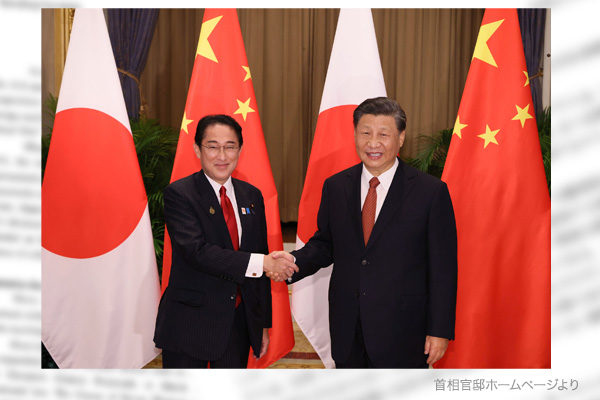In a photo session for the first Japan-China summit in three years that took place in Bangkok on November 17, Chinese President Xi Jinping kept smiling when shaking hands with Japanese Prime Minister Fumio Kishida. In stark contrast, Xi looked grumpy in 2014 at his meeting with then Japanese Prime Minister Shinzo Abe. China’s smiling diplomacy is accompanied by ulterior motives. The U.S. Biden administration has demonstrated a tough attitude toward China by coming up with new restrictions on semiconductor exports to China. At a time when the Chinese economy is decelerating, Beijing is attempting to create a rift within an anti-China coalition led by the United States.
Why is Foreign Minister Hayashi in such a hurry?
Chinese Foreign Minister Wang Yi, who was present at the Kishida-Xi summit, abruptly canceled his planned meeting with his Japanese counterpart Yoshimasa Hayashi in August. This was because Japan and its Group of Seven partners angered Beijing by expressing concern over China’s large-scale military drills around Taiwan. China launched ballistic missiles into Japan’s exclusive economic zone in succession during the drills. It was natural for Japan to file a protest with Beijing against such firings. Japan had no reason to be criticized by Beijing.
Nevertheless, Kishida and Xi agreed to hurry Hayashi’s visit to China. It was Wang who cancelled the meeting at the last minute in August. It is China who should apologize for its rude action. Will shelving the issue and planning Hayashi’s visit contribute to what Xi termed the development of bilateral relations meeting the requirements of the new era?
Journalist Hataru Nomura, who has recently died, had been investigating China’s “organ hunting” in which organs were forcefully extracted from detained Uyghurs and Tibetans in China. “Unless Japan recovers its national power to reconstruct itself, it cannot afford to help weak people,” Nomura said in an interview with a mini communications publication. What Nomura termed national power naturally includes military power. Unless Japan has military power to withstand outside pressure, it may be “forced to become a dependent state of China that is undemocratic and brutal,” Nomura warned.
Build up defense capabilities
Perhaps Prime Minister Kishida shares a sense of crisis with Nomura. I assume so because it was Kishida himself who expressed “his determination to fundamentally reinforce Japan’s defense capabilities and secure substantial increase of its defense budget needed to effect it,” according to a joint statement issued after a summit meeting with U.S. President Joe Biden in May.
When a Japan-U.S. joint statement for a bilateral summit in 1981 included the word “alliance” for the first time ever, then Japanese Prime Minister Zenko Suzuki explained that the word had no military implication, losing confidence at home and abroad. Kishida leads the Kochikai faction within the ruling Liberal Democratic Party, which had been headed by Suzuki. Instead of repeating the same mistake as his predecessor, Kishida should abide by his promise and clearly show how to “fundamentally reinforce Japan’s defense capabilities” in the government’s budget proposal to be formulated at the end of the year.
Takashi Arimoto is a Planning Committee member at the Japan Institute for National Fundamentals and publisher of Monthly Magazine SEIRON at the Sankei Shimbun newspaper.


